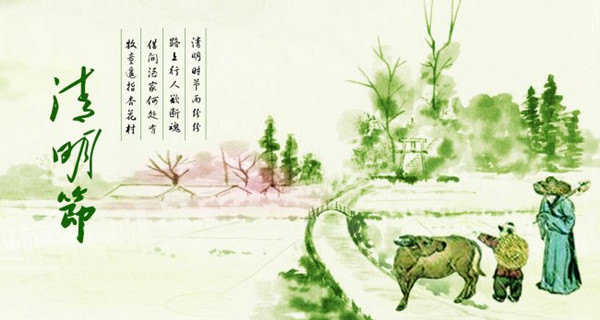The veneration of the dead is practiced across the whole world, and in China this ritual activity is most practiced on during Qingming Festival, which usually arrives around April 5. After the festival, the environment will become more of spring, which means everything leaves the past behind and welcomes the new, including the plants in nature and the humans. According to the Chinese Fengshui theory, this is a traditional period during which yin (what winter features) turns to yang (what spring has). What do people usually do during this period of time?

Sweeping tombs
Qingming Festival is also translated to Tomb-Sweeping Day, which mainly means this is a day for people to sweep tombs of their relatives, friends, ancestors or others whom they respect or care. However, this translation has narrowed the true meaning of the Chinese phrase. Lots of things are done during this time. By the way, this festival doesn’t necessarily only last for one day but many days. In China’s rural areas, when people sweep tombs, they usually burn paper money and yellow paper (a kind of roughly-produced paper mainly used for burning for the dead). When people sweep tombs, they usually cry, kowtow or bow to show their respect and remembrance of the dead.
Spring Outing
However, Qingming is not only a time for you to cry and worship, but also for you to have a nice spring tour. In the past in China, Qingming Festival usually served as the festival of spring outing. However, spring outing time differs from region to region. Some may happen in the first lunar month of a year, and others may happen in February or March. Nowadays in China, apart from sweeping tombs, people usually go outdoors to enjoy themselves in the wild of spring.
Playing swing sets
The wing set in China was invented by the ethnic minorities living in the north of China, and introduced to the areas where the Han Chinese once lived during the Spring and Autumn Period (770 BC - 476 BC). Since it was easy to install and learn to play, it was loved by the people of that time and was quickly spread to many parts of China. After the Han Dynasty, playing swing sets gradually became a hot activity during Qingming Festival and Duanwu Festival (Dragon Boat Festival). Now it has been widely installed and played across the world.
Inserting willow twigs
During Qingming Festival, people usually insert willow twigs under their roofs or make garlands out of the willow twigs and wear them on their heads. Since Qingming Festival is to worship the dead, ghosts are the most important actors of the time. According to Chinese tradition, willow has the power to drive away evil spirits. That’s one reason why people insert willow twigs. Another reason that people do so is to wish their ancestors’ souls to stay, because willow in Chinese is Liu (柳), which shares the similar pronunciation with Liu (留: stay).
Planting trees
In China, the official Tree-Planting Day arrives on March 12, but the best time to plant trees is during Qingming Festival, for the climate becomes warm, and the rain of spring falls more frequently. Under these conditions, trees planted are easy to survive. Thus, some people in China choose to plant trees during this time too.
Flying kites
Flying kites is one of the most loved traditional games of the Han Chinese and is also one of the activities practiced during Qingming Festival. The kite was once usually named Zhiyuan (纸鸢: paper eagle or paper bird), and invented by Lu Ban (the ancestor of all carpenters in China; 507 BC - 444 BC), who made the first kite with bamboo. Although people flying kites in nearly all seasons, the tradition of flying kites during Qingming Festival in China still remains.



